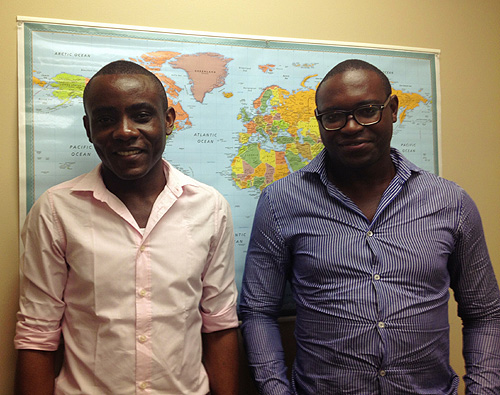Posted by Lucile Scott on August 8, 2013
In late June, an unknown assailant set fire to GMT Initiative grantee partner Alternatives-Cameroun's Access Center and headquarters with a Molotov cocktail—the latest in a recent string of vandalism attacks against Cameroonian gay rights organizations and leaders. Two weeks later, 34 year-old Cameroonian LGBT activist and journalist Eric Lembembe was tortured and killed in his home. Shortly after, Alternatives suspended its HIV outreach work. Last week, Yves Yomb, Alternatives' executive director, and Franz Mananga, administrative and financial director, flew to New York City to try and obtain funding for security measures needed to protect the lives of their staff and clients. While they were here, they sat down with amfAR to discuss these recent events and why they continue to visibly fight for LGBT rights despite the danger. To donate to their security campaign click here and type "Cameroon Emergency Fund" in the "If through a board or staff member" field at the bottom of the page.
Yves: Anything can happen and we don't have the basic materials for our security. We don't have a guard. We don't have a fire extinguisher in case there is another fire. When we received news of Eric's death, the entire staff moved out of our homes, because as advocates we are very vulnerable. The biggest organizations that receive funding from big donors like USAID, PEPFAR, and The Global Fund only fund us as HIV peer educators who go out into the field, but they do not give us funding for security. We stopped outside outreach, but continue to provide limited services inside the Access Center. But even that is dangerous. The center is open to anyone and we do not know who is coming in. But many people rely on us. If we close completely, many of our clients will not have a means of getting their HIV drugs or other health services, or have a place where they can come to feel comfortable.

Alternative-Cameroun’s Yves Yomb and Franz Mananga inside amfAR’s New York offices.
Franz: We can only feel the joys of being gay in our center. We have shows and dances as well as HIV testing and health services. I began working with Alternatives when it started in 2005 just to know other people like me because I was very alone. We opened the Access Center with the support of amfAR and now we see 500 or 600 people a month.
Yves: We arrived to work one morning and found the center on fire. We were really really afraid. Two weeks before his death Eric wrote an article about the fire in the Access Center and we think that is the reason why they killed him—to shut the mouth of LGBT. They think if we don't have a journalist who can write about sexual minority rights, who will do it? At first the police said that there was nothing to do, but there was pressure from the U.S. government and others so they started an investigation. Then they said that they thought the LGBT community was responsible for Eric's murder, even though there was no proof, and arrested three members of the community. They were later freed.
Franz: Honestly, we don't know why all of this is happening now. But there is an election now. There are work issues, education issues, and medical issues, and the government uses homosexuality as a distraction. They say if the country is bad now, it's the fault of the homosexual. When one minister doesn't agree with another, they say, this man is a homosexual. Sometimes they say that there is no harassment of gay people in Cameroon.
Yves: They always say it is white man made, that homosexuality is not African, not Cameroonian. We continue to dialogue with members of the government, the media, and the religious leaders who always take a position against homosexuality. When we began working in 2005, there was nothing said about gay rights. But now there is a sort of debate. People go on TV and speak about homosexuality. Even if it is bad, when people give their opinion, maybe they begin to accept that this population exists in Cameroon, and maybe they begin to change. Now MSM are included as a key population in the National Health Strategy for HIV. We pushed the Ministry of Health for this and it is a huge victory.
Franz: We don't know where we find the courage to continue the work. If we want change, no one will do this but us. But we have no safety. I'm 29. My whole life is in front of me, but it's dominated by extreme fear. Tomorrow we will get on a plane and go back, and we don't know what will happen.
Yves: In all the histories of revolution that we read, there are always people who lost their lives or were put in jail. We know this revolution in Cameroon will take time, as do all the revolutions in the world. We don't know if we will see the result, but we hope in 10 or 20 years, people will say the fight for gay rights began in 2005, and thanks to them we have the rights that we have at this moment.